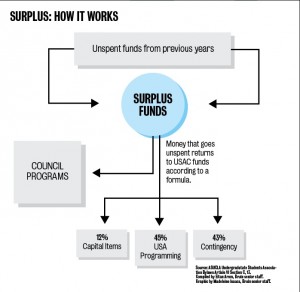[media-credit align=”alignnone” width=”300″]Most students know what it feels like to crack open a textbook for the first time the day before a midterm – the sinking feeling in your stomach, the rising panic as you realize just how much you have to cram in your head before morning.
As seventh week begins, the Undergraduate Students Association Council is coming up on its own big test. Sometime in November, the council typically receives an estimate on the amount of surplus funds available for it to spend, and it needs to avoid a last-minute cram session.
Despite the fact that they have not yet received exact numbers for the surplus, councilmembers should all be thinking about what their priorities are for spending this money. More importantly, they should communicate with one another about their plans.
In the past, councils have used surplus money, which comes from funds unspent the previous year, to pay for programs like Night Powell and Strathmore Safe Rides.
This year’s council campaigned on several similarly ambitious programs that promise to be relatively costly, such as Facilities Commissioner Armen Hadjimanoukian’s idea to implement a thrift shop that would raise money for clubs and General Representative Lizzy Naameh’s platform to expand mental health resources on campus.
If councilmembers plan to use surplus funds for these kinds of programs, discussion and planning should start now.
USAC Finance Committee Chair Cynthia Jasso declined to comment on current expectations for surplus funds.
But at tonight’s meeting, whether surplus projections emerge or not, council needs to broach the topic of surplus and discuss each member’s priorities for spending the funds.
Council can choose to spend the funds on its own programming, and whatever money isn’t spent is divided up into student group programming funds according to a set formula.
Any councilmember thinking about using surplus funds should be cognizant of the fact that whatever money council takes from the fund will not be put back into student group programming funds.
Councilmembers need to be sure, then, that their plans for spending the money are well thought out and more beneficial to the student body than simply funneling it all back to student groups directly.
This kind of planning takes time, and the timetable for setting surplus in stone is a short one. Ideally, all councilmembers would have their requests for surplus spending in by tenth week of fall quarter, Jasso said.
One programming fund, called the capital contingency fund, which gives money to student groups for office equipment, is completely dependent on surplus. USAC cannot open the fund until surplus spending has been finalized, so councilmembers need to iron out their plans for that money as soon as possible.
That means councilmembers should be thinking and communicating about how to spend surplus even before numbers are in.
USAC President John Joanino said as of now, there has been no formal discussion among councilmembers about surplus.
Last year, then-President David Bocarsly used surplus funds to establish an endowment with the UCLA Foundation. The endowment allows council to invest money from surplus at a guaranteed 5-percent return rate.
Joanino said he is interested in continuing with the endowment, but wants to take into consideration that it doesn’t reap immediate benefits for students.
With this added complication, the conversation about surplus needs to happen even earlier than usual. Even without exact numbers, councilmembers can discuss what they think about the endowment, and what percentage of surplus funds they think should go toward it.
The hundreds of thousands of dollars of surplus come out of every undergraduate’s pocket, and it is council’s responsibility to make sure to use the money in a way that benefits the campus the most.
It’s early in the year, and there is no definitive decision to make tonight, but talking about surplus at tonight’s meeting could prevent a last-minute rush to figure out how to spend the money when the time comes.
Email Delgadillo at ndelgadillo@media.ucla.edu or tweet her @ndelgadillo07. Send general comments to opinion@media.ucla.edu or tweet us @DBOpinion.
